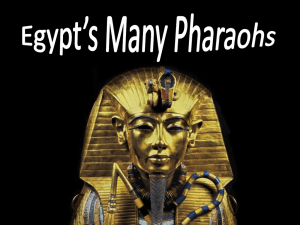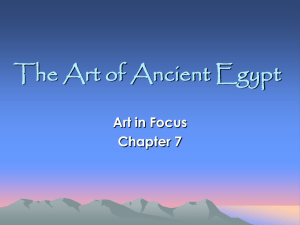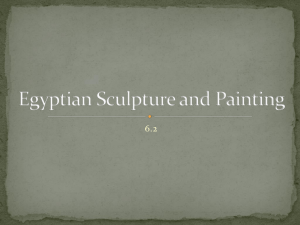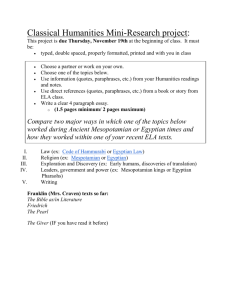Egyptian Pharaohs
advertisement
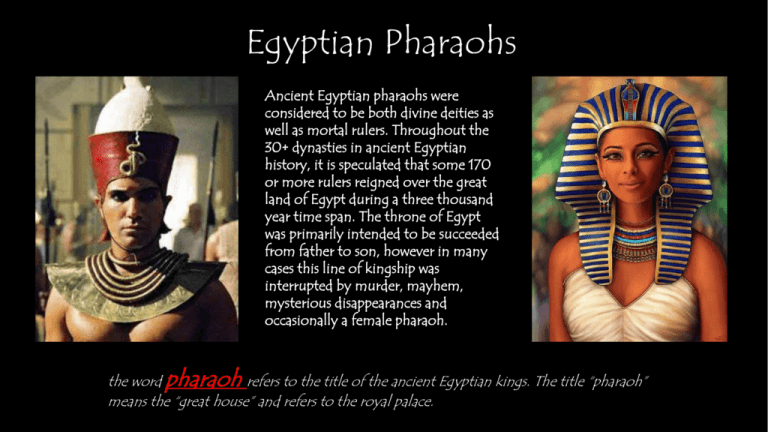
Egyptian Pharaohs Ancient Egyptian pharaohs were considered to be both divine deities as well as mortal rulers. Throughout the 30+ dynasties in ancient Egyptian history, it is speculated that some 170 or more rulers reigned over the great land of Egypt during a three thousand year time span. The throne of Egypt was primarily intended to be succeeded from father to son, however in many cases this line of kingship was interrupted by murder, mayhem, mysterious disappearances and occasionally a female pharaoh. the word pharaoh refers to the title of the ancient Egyptian kings. The title “pharaoh” means the “great house” and refers to the royal palace. Egyptian Pharaohs Pharaohs were the god kings of ancient Egypt who ruled between 3150 B.C. and 30 B.C. (when Rome conquered Egypt). Each time a new family took control of the throne, a new kingdom began in the history of this fascinating nation. While rulers often intermarried with daughters, granddaughters, sisters and brothers to keep the throne within the family the throne still managed to shift hands multiple times; creating a dynamic and complex pharonic history. Egyptian Pharaohs Djoser (Zoser) (2630 -2611 BCE) 3rd Dynasty • Built the largest stone funeral complex in the world: the stepped pyramid at Saqqara. Egyptian Pharaohs Khufu (Cheops) (2551-2528 BCE) 4th Dynasty • Ordered the construction of the Great Pyramid of Giza • The Great Pyramid of Giza would be his mausoleum • Khufu’s son (Khafre) and grandson (Menkaure) built the other pyramids at Giza Egyptian Pharaohs Ramesses II (1279-1213) 19th Dynasty • Multiplied the number of colossal statues, building the temples at Abu Simbel & the Ramesseum • Founded the city of PiRamesses, his capital Egyptian Pharaohs Akhenaten (1352 – 1336) 18th Dynasty • Promoted the monotheistic cult of Aten, installing his capital at Tell el-Amarna, a key site in the understanding of this period Egyptian Pharaohs Nefertiti (1338 – 1336) 18th Dynasty • The great wife of Akhenaten, whom he made coregent • Her bust found at the site in Amarna, is one of the most famous. Coregent (Co-regent): Joint ruler Coregency (or co-principality): situation where a monarchical position (such as king, queen, emperor or empress), normally held by only a single person, is held by two or more. Egyptian Pharaohs Thutmose I (1504 -1492 BCE) 18th Dynasty • Expanded the Kingdom from Upper Nubia • Waged war on the banks of the Euphrates • Founder of the Royal Theban necropolis at the Valley of the Kings Egyptian Pharaohs Hatshepsut (1473 – 1458 BCE) 18th Dynasty • Heir to Thutmose I • Most powerful female Pharaoh in Egypt’s history • Ordered the construction of the Djeser-Djeseru temple, one of the greatest architectural jewels of Ancient Egypt Egyptian Pharaohs Thutmose III (1479 – 1425 BCE) 18th Dynasty • Known as “The Great” • Oversaw the kingdom at its greatest extension • Reigned over kingdoms in the Middle East & Eastern Mediterranean • Built the temple of Amun-Re at Karnak Egyptian Pharaohs Tutankhamun (1336 – 1327 BCE) 18th Dynasty • Famously known as “King Tut” • Son of Akhenaten • He restored the cult of Amun • The most famous Pharaoh as the result of the intact discovery of his hypogeum (underground vault) in 1922 in the Valley of the Kings Egyptian Pharaohs Amenhotep III (1390 – 1352 BCE) 18th Dynasty • His reign stands out as one of the busiest construction periods in Ancient Egypt • The Colossi of Memnon are the remains of an amazing temple built next to the Nile

